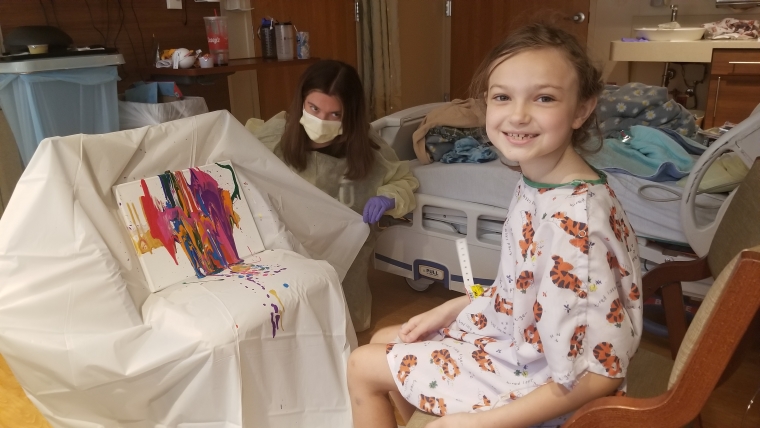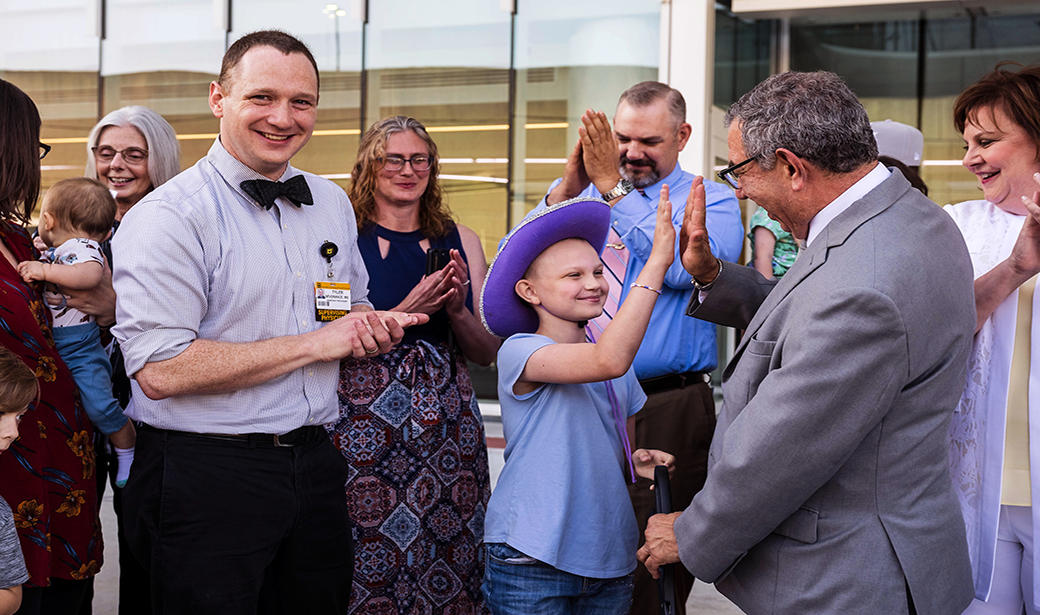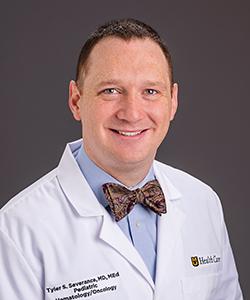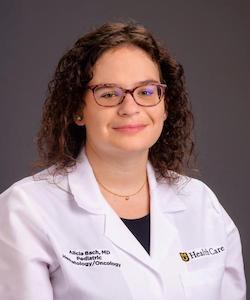The first few times Tyler Severance, MD, walked into Makayla Crockett’s room at Children’s Hospital, he was surprised: His patient, it seemed, wasn’t there.
Soon enough, Dr. Severance, a pediatric oncologist and hematologist, learned to wait for giggles or other sounds warning him the 9-year-old was about to jump out from behind her bed or around the door.
“I was caught off guard an embarrassingly high number of times,” Severance said. “I had to be on my toes at all times, even if I was just walking in the door, that she may be hiding right in plain sight ready to scare me.”
Makayla, a Columbia native, first came to the Children’s ER in June of 2023 after fainting twice in 24 hours. Her parents, Rolf and Brandy, knew something was wrong, but didn’t expect to hear Makayla had acute B cell lymphoblastic leukemia, or ALL.
It’s the most common form of childhood cancer, but it is also aggressive. Makayla’s doctors, including Dr. Severance, Alicia Bach, MD, Barbara Gruner, MD, Altaf Jamil, MD and Kim Ebersol, PNP stepped up to plan the next steps in Makayla’s care, starting that week.
“We all sat down in a big conference room with this gigantic three ring binder,” Rolf said. “They were awesome at answering the minute little questions that we bombarded them with, trying to understand every little aspect so that we can get an idea ourselves of what to do. It was because of the next-door neighbor feel we got from the care team that we chose MU Health Care.”
Cancer treatment is difficult, time-consuming and exhausting, so Makayla’s care team found ways to take the stress out of cancer care, whether it was a visit from Link or painting in her room with syringes to make them feel less scary.
“When I was first admitted I was really shy, but the child life specialists and nurses made me feel so much more comfortable,” Makayla said. “They helped me understand I was sick, and I was there to get better. And Link is like a big teddy bear who just wants to lick your hands.”

Full of Surprises
In addition to her hospital room hijinks, Makayla found other ways to surprise Dr. Severance and the rest of her doctors during treatment.
Her poise and attitude while admitted for chemotherapy infusions or antibiotic support was impressive. “Fight Song” by Rachel Platten was a source of strength when she needed it.
“It’s almost like having a child in sports and they hit a home run or they dunk the ball, and you’re like, ‘Yeah, that’s my kid,’” Rolf said. “When you see your kid take a hypodermic needle during a biopsy and not flinch, there’s a feeling of pride. But you’re also thinking that there’s no way my child should be going through this.”
Another surprise was her diet. Managing proper nutrition is particularly important for people going through chemotherapy because the drugs can make you nauseous or lose your appetite. Dr. Severance was impressed by how often Makayla cleaned her tray of food when she was in the hospital, until he found out she had help.
“Makayla was taking food from her meal trays so that she could go outside the emergency department entrance and leave it for a small bunny rabbit population living in the bushes,” Severance said. “We had to clarify that just because the food is no longer on her plate doesn’t mean Makayla actually ate it.”
She made as many friends as she could — animals and care team members alike — during her inpatient visits, which included two rounds of chemotherapy and biopsies to check her bone marrow. The results of her tests showed that traditional chemotherapy had slowed her cancer down but hadn’t eliminated it.
“Makayla still had remnant cancer after the first and then ultimately second cycles of chemotherapy,” Severance said. “We needed to look at other options because her leukemia proved to be a little more resilient, or refractory, than the typical standard leukemia.”
Her care team suggested a newer drug, blinatumomab, that showed promising results in treating refractory leukemia. This chemotherapy drug is given slowly over 28 days as an inpatient infusion and then at home using a specialized pump that is carried in a shoulder bag. Unfortunately, MU Health Care didn’t have any.
A Surprise Switch Up
This time, Dr. Severance had a surprise for Makayla and her family. A donation by GP M.A.D.E., the foundation created by cancer survivor and former Mizzou head football coach Gary Pinkel, enabled Makayla’s care team to get her the specialized pump she needed to receive blinatumomab. Makayla was the first pediatric patient at MU Health Care to receive the treatment.
“Dr. Severance told us about this special little girl and these pumps, and we made the decision to go that route,” Pinkel said. “It certainly was mammothly important for them to make sure they could help her, and fortunately they have. MU Health Care is really going after it. They want to be better and better, and I would like to think that we’re an influence in a positive way for what they're doing.”
GP M.A.D.E., or Making A Difference Every-Day, raises money to donate to pediatric cancer research and cancer care as one of its three pillars. Since 2019, GP M.A.D.E. has paid out $1,055,000 in scholarships and grants.
Donating the pumps ensures MU Health Care has the infrastructure and equipment needed to offer this treatment to patients in the future, making GP M.A.D.E.’s help a sustainable improvement in patient care.
“Before we could finish the request there was a resounding ‘yes’ on their side,” Severance said. “This was such a natural combination of the core pillars of the GP M.A.D.E. Foundation and their goal, their mission, and they were just immediately there to help.”
The change in treatment made an immediate difference for Makayla. After two rounds of the therapy, the family got the good news: No detectable cancer cells. She’s currently in maintenance treatment, which means one or two clinic visits per month and less frequent, less intensive chemotherapy infusions.
“She wore this little backpack for 28 days and came in once a week for a needle change,” Rolf said. “She got to be at home, which made life more normal for us, and the medication worked really well for her.”
With the right team behind her, and the generous support of GP M.A.D.E., Makayla got the care she needed and is winning her fight against leukemia.
“To other kids fighting cancer, I would say just think on the bright side,” Makayla said. “You're going to make it through. You are doing great at it. Keep doing the best you can.”






